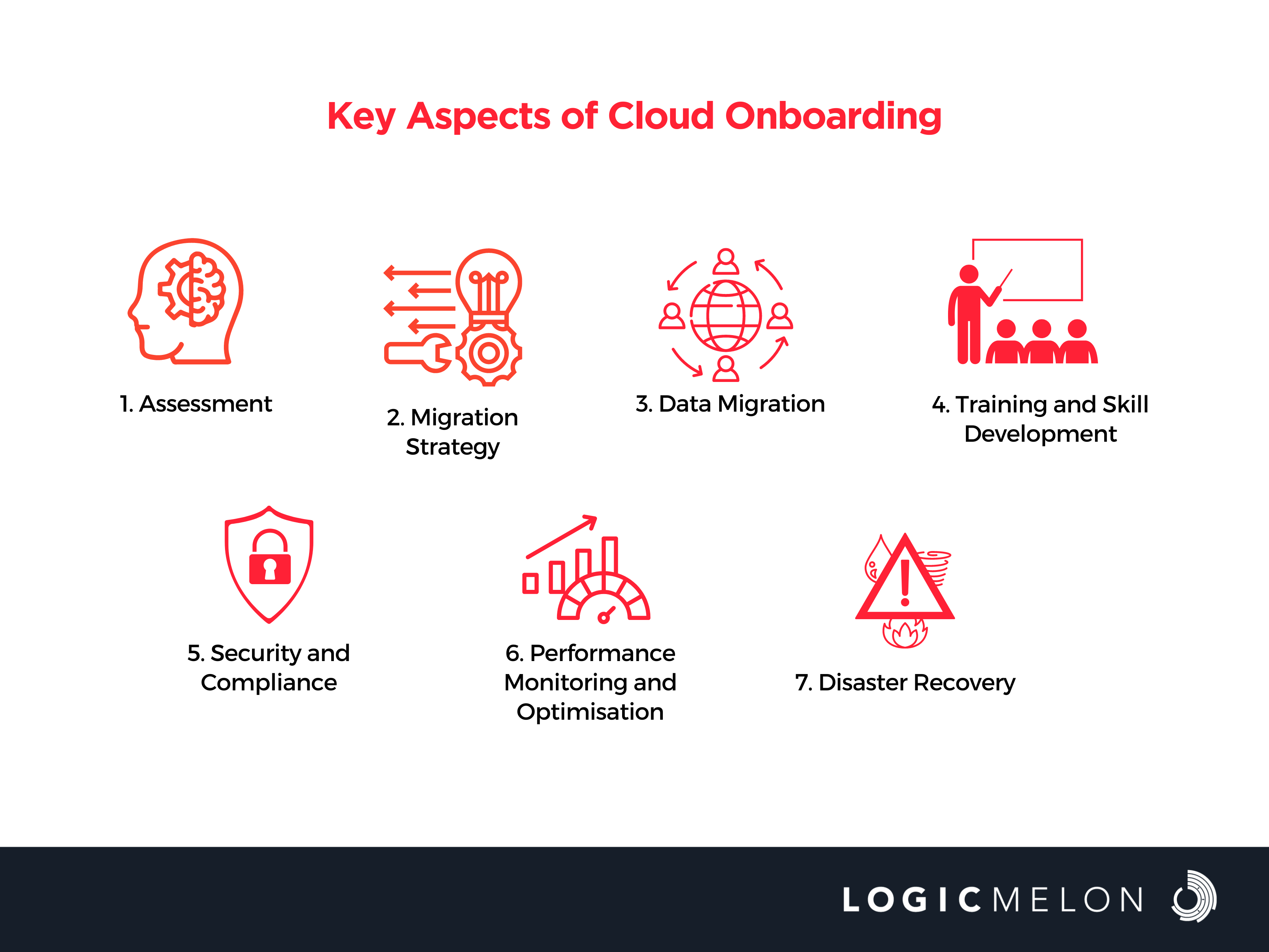Cloud Onboarding: Your Roadmap to Digital Transformation
Greetings, fellow cloud enthusiasts! Today, we embark on a thrilling expedition through the realm of cloud onboarding. What’s cloud onboarding, you ask? Well, it’s the magical process of migrating your digital goodies – applications, workloads, and cloud computing environments – into the cloud. Picture it as a grand adventure into the future of digital excellence!
Cloud onboarding isn’t just about tossing your digital stuff into the cloud and hoping for the best. Oh no, it’s a well-thought-out journey that requires meticulous planning, a good hard look at your existing infrastructure, choosing the right cloud service model, and picking a cloud provider that suits your fancy.
Our mission? To tap into the cloud’s superpowers: scalability, flexibility, cost efficiency, and access to all those shiny advanced technologies. But fear not, for we shall navigate this journey securely and seamlessly!
Before we set sail, it’s essential to understand why cloud services are all the rage. Think flexibility, stability, speed, quality, availability, and innovation – all rolled into one cloud-shaped package. But wait! There’s a catch. You need to be well-prepared and have a sturdy compliance framework in place for this transformation to be a roaring success.
The key aspects of cloud onboarding are:
Now, let’s get down to the nitty-gritty of cloud onboarding:

1. Assessment:
The Explorer’s Toolkit Before you hoist the cloud anchor, it’s vital to assess your readiness. What does that entail? Evaluating your current infrastructure, sizing up security and compliance needs, and crafting a migration strategy that takes into account cost, complexity, security, and compliance.
But that’s not all! The adventure continues as we delve into the cloud’s depths, evaluating and adapting to ever-evolving business needs and technological marvels.
2. Migration Strategy:
Choosing the right migration strategy is like selecting the perfect crew for your ship. Your options range from leveraging existing resources to formulating strategies based on cost, complexity, and desired outcomes. It’s all about efficient resource management and cost-effectiveness.
Gather your trusty crew – a skilled, cross-functional team with expertise in IT, operations, compliance, and more. We’re setting sail for success!
3. Data Migration:
Treasure on the Move Ahoy, mateys! The heart of cloud onboarding is data migration. Safely and securely moving your precious data while minimising downtime and data loss is the name of the game.
This treasure hunt involves careful planning, execution, and validation to maintain data integrity, security, and minimal disruption. It’s a collaborative effort that includes IT crews, data guardians, and end users, ensuring a smooth voyage into the cloud.
4. Training and Skill Development:
Preparing the Crew To harness the full potential of cloud technologies, invest in training your crew. Equip them with cloud-based skills and best practices, for in the cloud, security is a shared responsibility. A well-trained crew ensures smooth sailing, even in the stormiest of digital seas.
Remember, cloud onboarding is an ongoing odyssey. Keep investing in skills and development to steer your ship to success while maintaining security and compliance.
5. Security and Compliance:
Fortifying the Ship In our cloud adventure, security and compliance are the fortress walls. Implement robust security measures, encryption, access management, and compliance monitoring. Prioritise data security and privacy compliance to ensure a safe voyage.
Security and compliance are ongoing responsibilities in the cloud. Stay vigilant, collaborate with cloud providers, and stay shipshape in a secure and compliant cloud environment.
6. Performance Monitoring and Optimisation:
Smooth Sailing Ahead Our journey wouldn’t be complete without monitoring and optimization. Set performance goals, measure key performance indicators, and navigate toward your organisation’s expectations. Regular reviews and tweaks to the ship’s configuration keep our cloud infrastructure shipshape.
Efficiently managing and optimising cloud resources ensures we reap the benefits of cloud computing while keeping costs in check. Ready the performance tests – we’re testing the waters for peak performance!
7. Disaster Recovery:
Preparing for Storms Ah, the unexpected storms of the digital seas! Disaster recovery is our trusty lifeboat, ensuring the availability and resilience of cloud-based systems and data when tempests strike. Cloud-based backup and recovery solutions come to our rescue.
Prepare your crew with the tools and resources needed for recovery. In times of trouble, we shall weather the storms and emerge stronger.
Challenges of Cloud Onboarding
Our cloud voyage isn’t without its challenges. Data security concerns, compatibility issues, and cost management can be treacherous waters. But with careful planning, assessment, and execution, we can harness the full potential of cloud technology while ensuring data security and compliance. Let’s conduct thorough testing and maintain a secure and efficient cloud environment through regular audits and reviews.
The challenges organisations face during cloud onboarding include data security concerns, application compatibility issues, and cost management. Moving large volumes of data to the cloud is time-consuming. If not managed carefully, the initial data transfer and migration processes lead to downtime and potential data loss.
Managing and controlling cloud costs continues to be a significant challenge. Organisations will face unexpected cost overruns if the resources are not adequately managed and monitored. Addressing these challenges involves clear planning, assessment, and execution of the benefits of cloud technology and ensuring data security and compliance. Conduct thorough testing that includes functional testing, performance testing, and security testing. Regularly audit and review security to maintain a secure environment.
Also, the transition to the cloud often requires a cultural shift within an organisation. The employees must adapt to the new ways of working and manage resources to overcome resistance and challenges.
Frequently Asked Questions
1. Is cloud onboarding a one time process?
No, cloud onboarding is an ongoing journey. The organisations must have to adapt to the changing trends such as technologies, business needs and workloads. This requires continuous improvement and optimization.
2. How can I ensure data security during cloud onboarding?
Implement robust security controls, encryption, access management, and compliance monitoring. Prioritise security and privacy compliance to protect sensitive data in the cloud. Regularly update security measures to adapt to evolving threats.
3. How can I optimise cloud resources after onboarding?
Continuous monitoring and optimization are vital. Regularly review and revise resource configurations, update security policies, and optimise data storage strategies. Performance testing helps ensure that the cloud infrastructure meets performance requirements.
Cloud Onboarding Success: A New Horizon for Your Business
Cloud onboarding is a strategic initiative that allows the organisation to modernise their IT infrastructure and experience the advantages of cloud technology. It involves careful planning, execution, and ongoing management to ensure a smooth transition to the cloud.
Cloud onboarding is a transformative journey that empowers the organisation to utilise the benefits of cloud computing and address the challenges effectively. Successful onboarding requires careful planning, rigorous execution, and ongoing optimisation.
LogicMelon
Award-winning recruitment software that will find, attract, hire and analyse the way you want to work. At LogicMelon, we have experienced software recruitment marketing specialists to help you build effective recruitment solutions supported by the best customer service you’ll find anywhere!
Email: sales@logicmelon.com or call LogicMelon (UK) +44 (0) 203 553 3667 (USA) +1 860 269 3089
Recruitment Data Visualisation: Everything You Must Know
As a recruiter, you go through a lot of information daily. Recruitment data visualisation simplifies the complex data, making it easier to understand and act upon.
The Role of Soft Skills in Leadership Recruitment
In leadership development, soft skills are essential for identifying individuals who can not only manage but also inspire and guide teams to success.
ATS and CRM in Talent Acquisition
By utilising the strengths of ATS and CRM, organisations can create a comprehensive talent acquisition strategy that combines relationship building with an efficient hiring process.


